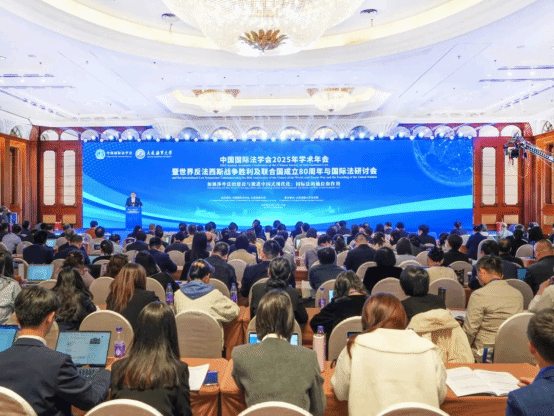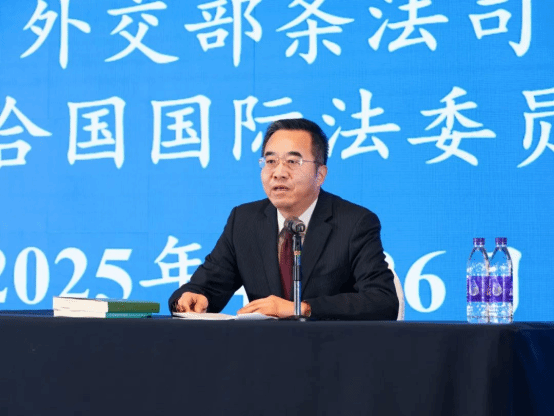

On April 26, 2025, the “2025 Annual Academic Conference of the Chinese Society of International Law and the International Law Symposium Commemorating the 80th Anniversary of the Victory of the World Anti-Fascist War and the Founding of the United Nations” was opened grandly at the Furama Hotel Dalian. The event was co-hosted by the Chinese Society of International Law and Dalian Maritime University, and organized by the School of Law of Dalian Maritime University. Centered on the theme “Strengthening the Rule of Law in Foreign Affairs and Promoting Chinese Modernization: The Status and Role of International Law,” the conference attracted more than 1,200 experts, scholars, practitioners, and students from universities, research institutions, government departments, and the legal profession across the country to explore the mission and innovative development of international law in the new era.

The opening ceremony was chaired by Professor Li Ming, Executive Vice President of the Chinese Society of International Law. Professor Xu Minqiang, Secretary of the Party Committee of Dalian Maritime University, delivered a welcome speech, warmly greeting the attending guests. He highlighted the university’s outstanding achievements in recent years in foreign-related affairs and maritime fields, including teaching, scientific research, and participation in the formulation of international rules.
Hua Chunying, Vice Minister of Foreign Affairs; Wang Shumei, Standing Member of the Adjudication Committee of the Supreme People’s Court (vice-minister level); Huang Yi, Director of the Political Department and Member of the Leading Party Members’ Group of the Ministry of Justice; and Professor Huang Jin, President of the Chinese Society of International Law, each delivered opening remarks.

Hua Chunying emphasized the vital importance of the international order underpinned by international law for post-war world peace and development. She pointed out that, under the new circumstances, advancing the rule of law in foreign-related affairs is crucial to safeguarding national interests. She called on the academic and professional communities in international law to contribute to Chinese modernization, the progress of international rule of law, and the building of a community with a shared future for mankind by focusing on five key aspects: upholding the correct political direction, strengthening institutional safeguards through rule refinement, enhancing practice-oriented guidance, fostering confidence in China’s legal philosophy, and consolidating talent development.

Wang Shumei stated that China has always remained a staunch force in upholding international fairness and justice and promoting the development of international law. Guided by Xi Jinping Thought on Socialism with Chinese Characteristics for a New Era, the people’s courts—an integral part of China’s foreign-related rule of law—have contributed judicial wisdom to the advancement of foreign-related legal frameworks and the reform of the global governance system. These efforts include fully leveraging the functions of foreign-related adjudication, continuously improving the foreign-related judicial system, and actively participating in the formulation of international rules.

In his remarks, Huang Yi summarized China’s innovative practices and successful experience in foreign-related rule of law. He emphasized the need to uphold the Party’s leadership throughout research on foreign-related legal issues, accelerate the development of a distinctive theoretical and discourse system for foreign-related rule of law with Chinese characteristics, and maintain a strong focus on practical application to serve national strategies. He also highlighted the importance of improving practical training mechanisms for talent in foreign-related legal affairs and enhancing China's international discourse power in the rule of law by telling compelling stories of China’s legal development and showcasing the strengths of its institutional system.

Huang Jin, on behalf of the Chinese Society of International Law, extended a warm welcome and heartfelt thanks to all the guests in attendance. He noted that, on the occasion of the 80th anniversary of the victory of the World Anti-Fascist War and the founding of the United Nations, the theme of this annual conference not only carries forward the spirit of history but also responds to the pressing questions of our time, embodying both a strong contemporary relevance and practical significance. Against the backdrop of profound global changes unseen in a century, Huang called on China’s international law community to bravely shoulder its responsibilities and mission by engaging with key issues such as the coordinated advancement of domestic and foreign-related rule of law and the enhancement of China’s international discourse power.


Following the opening ceremony, Ma Xinmin, Director-General of the Department of Treaty and Law of the Ministry of Foreign Affairs, and Yu Ning, Deputy Director-General of the Department of Treaty and Law of the Ministry of Commerce, delivered keynote reports. Ma Xinmin, in his report titled “New Developments and Trends in the Current International Situation and Global Governance”, analyzed the evolution of the international landscape and highlighted major trends in international law, including the diversification of international actors, the overextension of human rights issues, and the mainstreaming of climate change. Yu Ning, in his presentation titled “Foreign-Related Rule of Law in the Commercial Field and the Development of International Law”, outlined the current challenges faced in promoting rule of law in the commercial sector’s foreign-related affairs. He encouraged experts and scholars to contribute intellectual support in areas such as the extraterritorial application of Chinese law, counter-sanctions, and the reshaping of international economic and trade rules.
This year’s annual conference features 11 parallel panel sessions, 4 youth forums on international law, and 4 thematic side events. From the afternoon of April 26 to the morning of April 27, participants will engage in academic discussions and exchanges on a wide range of topics, including: building a community with a shared future for mankind and international law; accelerating the development of foreign-related rule of law and Chinese modernization; the law of the sea and polar law; international climate change law and environmental law; applied studies of international law; issues in international economic law and global governance; legal regulation of cyberspace and artificial intelligence; international human rights law; international humanitarian law; international criminal law; the history and fundamental theories of international law; issues in private international law in the context of global governance; and methods and pedagogy of international law.
In addition, the annual conference includes two special seminars, namely “the International Law Symposium Commemorating the 80th Anniversary of the Victory of the World Anti-Fascist War and the Founding of the United Nations” and “Building a Community with a Shared Future for Mankind in Outer Space”, with discussions centered on the post-war international order and new developments in the legal regime governing outer space.